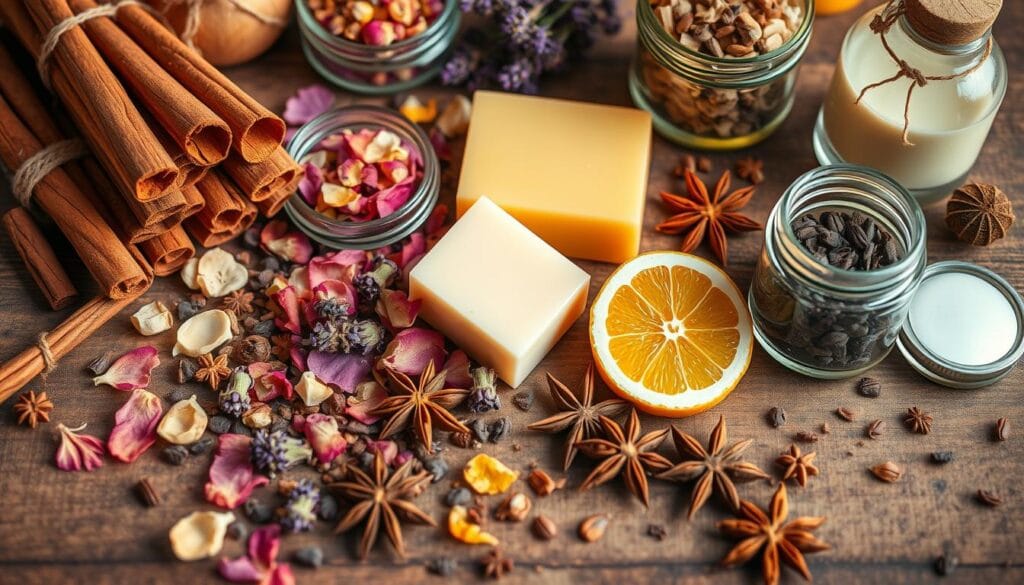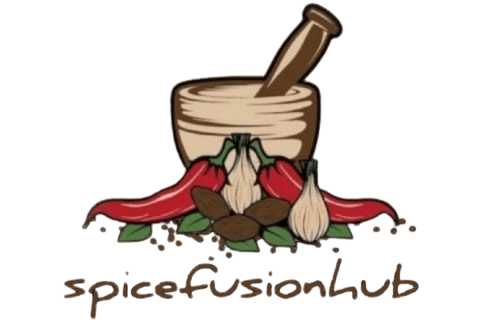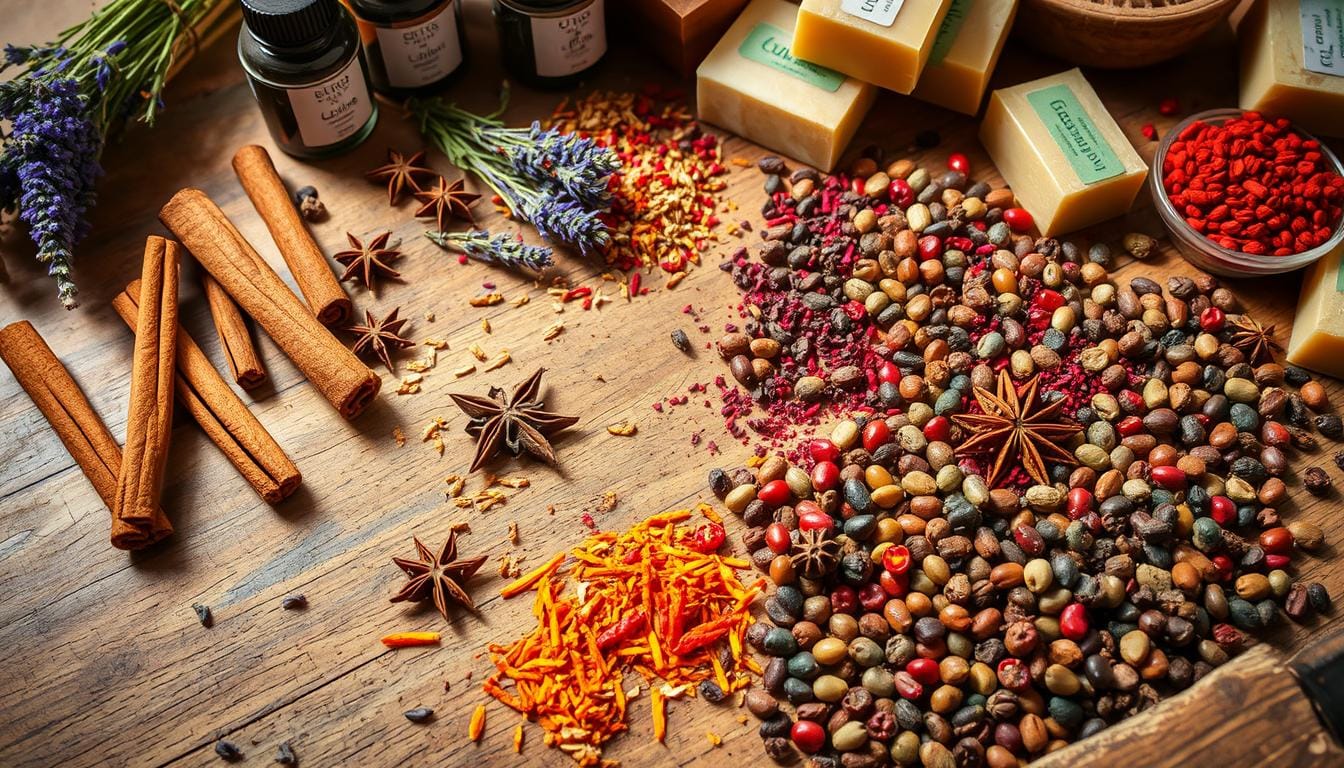Spices for DIY Perfumes and Soaps
Imagine making your own unique fragrances with spices for DIY perfumes and soaps. You can use natural ingredients to create scents that show off your personality. Spices open up a world of possibilities for DIY projects, making your creations stand out.
As more people look for natural products, adding spices to your DIY projects can make them even more special. Spices like cinnamon and cardamom can give your creations a unique touch. This makes them perfect for those who love making their own scents.
Table of Contents
Key Takeaways
- Spices can be used to create unique and alluring fragrances for DIY perfumes and soaps, utilizing natural fragrance ingredients.
- Natural fragrance ingredients offer a healthier alternative to synthetic fragrances, making homemade scent blends a popular choice.
- Homemade scent blends allow for customization and personalization, enabling you to create fragrances that reflect your personality and style, using spices for DIY perfumes and soaps.
- Spices can add depth and character to your DIY projects, making them stand out from commercial products, thanks to the use of natural fragrance ingredients and homemade scent blends.
- Experimenting with different spices and blends can help you discover new and exciting fragrances, perfect for those who enjoy using spices for DIY perfumes and soaps.
- Using spices for DIY perfumes and soaps is a creative and rewarding hobby that can be enjoyed by people of all skill levels, leveraging natural fragrance ingredients and homemade scent blends.
Understanding the Role of Spices in Fragrance Creation
Spices have been used for centuries to create unique fragrances. The art of making fragrances involves mixing spices, herbs, and essential oils. Aromatic herbs like lavender and chamomile are used for calming scents. Essential oils like tea tree and eucalyptus add refreshing touches.
Organic botanicals, such as rose petals and jasmine, are prized for their delicate scents. Perfumers mix these ingredients to create complex fragrances. This process is both an art and a science, as it requires understanding how different ingredients work together.
The Science Behind Scent
The sense of smell is closely tied to our emotions. Fragrances can bring back memories and evoke feelings. Perfumers study how molecules interact with our noses to predict scents.
How Spices Impact Scent Profiles
Spices can change the scent of a fragrance, adding depth and warmth. Cinnamon and cloves bring a spicy warmth, while cardamom and coriander add a fresh note. By blending spices, perfumers create unique and memorable fragrances.
Popular Spices for DIY Perfumes
Spices are key in making unique DIY perfumes. They are not only fragrant but also good for the environment. Cloves, cardamom, and cinnamon are top picks for their distinct scents.
These spices are great for DIY perfumes. They offer a natural and eco-friendly option. By using them, you can make fragrances that are both unique and green.
Cloves: Warm and Comforting
Cloves bring a cozy, warm smell to DIY perfumes. They’re perfect for fall and winter scents. Their scent evokes feelings of warmth and calm.
Cardamom: Exotic and Inviting
Cardamom has a unique, inviting smell. It’s often found in Indian and Middle Eastern perfumes. Its scent is great with floral or citrus notes in DIY perfumes.
Cinnamon: Sweet and Spicy Aroma
Cinnamon has a sweet, spicy smell. It’s used in DIY perfumes to add warmth and depth. Its scent is energizing, making it perfect for refreshing fragrances.
Spices to Enhance Soap Making
When making homemade soap, the right ingredients are key. Natural fragrance ingredients like spices can give your soaps a special touch. They make your soaps unique compared to store-bought ones. Using artisanal spice blends for cosmetics lets you create your own scents and colors.
Some popular spices for soap making include:
- Turmeric, which adds a warm, yellow color and a subtle, earthy scent
- Coriander, which provides a fresh, citrusy aroma
- Fennel, which gives a sweet, anise-like flavor and scent
These spices not only make the soap smell better but also look unique. By adding natural fragrance ingredients like these to your homemade soap making, you can make special products. They are both good for your skin and look great.
Using artisanal spice blends for cosmetics in soap making is also good for sensitive skin. It avoids harsh chemicals and artificial fragrances. With some creativity and trying out different things, you can make unique, natural fragrance ingredients-based soaps. They are perfect for yourself or as gifts.
Extracting Essential Oils from Spices
Getting essential oils from spices is key for making essential oils for soap making and organic botanicals for perfumery. It’s important to pick the right methods and take safety steps to avoid accidents.
For DIY aromatic creations, using top-notch spices and the right extraction methods is crucial. This ensures the oils are pure and strong.
Methods of Extraction
There are a few ways to extract oils, including:
- Steam distillation
- Solvent extraction
- Cold pressing
Each method has its own benefits and drawbacks. The choice depends on the spice type and the desired oil quality.
Safety Tips for DIY Oil Extraction
When extracting oils, safety is paramount to prevent accidents. Here are some tips:
- Wear protective gear like gloves and goggles
- Work in a place with good air flow
- Follow the right steps for handling solvents and tools
By sticking to these safety tips and using quality spices, you can make your own essential oils for soap making and organic botanicals for perfumery. This way, you can create your own DIY aromatic creations.
Blending Spices for Unique Fragrances
Creating homemade scent blends is a fun adventure. You can mix different spices to make unique fragrances. Spices like cinnamon, cloves, and cardamom can create warm, inviting scents.
Start with simple spice blends and then try more complex ones. Use spices to make top, middle, and base notes. For example, citrus spices like coriander and fennel make a fresh top note. Warmer spices like cinnamon and cloves add depth and warmth.
Creating Balanced Scent Profiles
A balanced scent is key for a fragrance that lasts and pleases. Mix spices with essential oils and absolutes for a balanced scent. Here are tips for achieving this:
- Start with a simple blend and add more complex spices and ingredients.
- Play with different ratios of top, middle, and base notes to find the right balance.
- Think about the strength and character of each spice and ingredient, and adjust your blend.

Trial and Error: Finding Your Perfect Mix
Finding the perfect scent blend takes time and patience. Don’t hesitate to try new spice combinations. Keep track of your recipes and results to refine your blends and create unique fragrances.
| Spice | Character | Usage |
|---|---|---|
| Cinnamon | Warm and sweet | Base note |
| Coriander | Fresh and citrusy | Top note |
| Cardamom | Exotic and aromatic | Middle note |
Using Spices Safely in DIY Projects
When making DIY perfume and soap, using sustainable fragrance materials and artisanal spice blends for cosmetics is key. It’s important to focus on DIY safety to avoid skin problems. This ensures a fun and safe experience.
It’s vital to know how each spice affects the skin. Spices like cinnamon and cloves can be strong and might irritate. Always check the right amount to use to stay safe.
Skin Sensitivities and Allergen Considerations
Before adding spices to your DIY project, think about these points:
- Skin type: If your skin is sensitive, start small and test it first.
- Allergies: Stay away from spices you’re allergic to.
- Concentration: Use the right amount of essential oils and spices to avoid irritation.
Recommended Dilution Ratios
Here are some safe dilution ratios to keep in mind:
| Spice | Recommended Dilution Ratio |
|---|---|
| Cinnamon | 1-3% |
| Cloves | 0.5-1.5% |
| Cardamom | 2-5% |
Creative Ideas for Spice-Infused Perfumes
DIY aromatic creations offer endless possibilities. You can mix natural ingredients to create unique scents that show your personality. Making perfume at home is like an art form, where you can play with spice blends and essential oils to craft special fragrances.
Layering Scents: Top, Middle, and Base Notes
To make a balanced perfume, you need to layer scents. Top notes are the first smell, middle notes add depth, and base notes last longest. By mixing spices and essential oils, you can create a scent that’s truly yours.
Personalizing Your Perfume Blends
One of the best things about making perfume at home is making it your own. You can try out different spice mixes, like cinnamon and cloves, or cardamom and coriander. Adding your favorite essential oil can give your perfume a special touch.
With a bit of creativity and trying new things, you can make DIY perfumes that are just as good as store-bought ones. So, why not try making your own perfume? With natural ingredients and a few simple steps, you can create a scent that’s all yours.
| Spice | Essential Oil | Perfume Type |
|---|---|---|
| Cinnamon | Lavender | Warm and soothing |
| Cardamom | Bergamot | Fresh and citrusy |
| Cloves | Vanilla | Rich and spicy |
Crafting Spice-Infused Soaps
Homemade soap making gets a boost with natural fragrances. Artisanal spice blends are especially loved for their unique scents. To start, learning how to infuse spices into soap is key.
Choosing the right soap base is crucial for flavor. Look for bases that enhance the spice’s aroma without dominating it. Olive oil, coconut oil, and shea butter are great choices. Here are some tips:
- Use high-quality spices that are fresh and potent
- Experiment with different spice blends to find the perfect combination
- Keep the spice infusion process simple and safe
By following these tips, you can make unique spice-infused soaps. These soaps can reflect your personal style, making each bar special. Whether you’re new or experienced, adding spice-infused soaps to your collection is rewarding.
With practice and patience, you can make beautiful, fragrant soaps. They’re great for yourself or as gifts. So, why not try making some with artisanal spice blends and natural fragrances?
| Spice Blend | Soap Base | Result |
|---|---|---|
| Cinnamon and Cloves | Olive Oil | Warm and Inviting |
| Cardamom and Ginger | Coconut Oil | Exotic and Refreshing |
| Nutmeg and Star Anise | Shea Butter | Comforting and Soothing |
The Environmental Impact of Natural Spices
Creating DIY perfumes and soaps has a big impact on the environment. Using natural and organic materials can greatly reduce our carbon footprint. These eco-friendly practices not only help the planet but also make unique and quality products.
The way we source natural spices is very important. Sustainable sourcing means getting spices without harming the environment. It also helps local farmers and supports fair trade.
Using sustainable materials has many benefits. For example:
- It reduces our carbon footprint.
- It helps save natural resources.
- It supports local communities and fair trade.
On the other hand, synthetic ingredients are bad for the environment. They are non-biodegradable and can harm our planet. Choosing eco-friendly DIY options lets us make products that are both beautiful and sustainable.
By using sustainable materials and eco-friendly practices, we can make a difference. This approach not only helps the planet but also makes products we can be proud of.
| Sustainable Materials | Benefits |
|---|---|
| Organic botanicals | Conservation of natural resources, support for local communities |
| Eco-friendly DIY practices | Reduced carbon footprint, unique and high-quality products |
Inspiring DIY Recipes Using Spices
Making DIY aromatic creations is fun and rewarding. It’s especially great when you use spices for DIY perfumes and soaps. You can create unique scent blends that show off your style. Start by trying out different spices and essential oils to find the best mix for your projects.
Spices can make your DIY perfumes rich and complex. For instance, cinnamon and cloves make a warm scent. Cardamom and coriander add a fresh, citrusy touch. You can also blend spices for your soaps, like turmeric and ginger for a soothing scent or fennel and lemon for a refreshing one.
Simple Perfume Recipe to Start
Begin with a simple perfume recipe. Mix 10 drops of cinnamon essential oil, 10 drops of clove essential oil, and 10 drops of vanilla absolute. Add 1 ounce of jojoba oil. This blend offers a warm, comforting scent perfect for daily use.
Basic Soap Recipe with Spice Additions
For a basic soap recipe, mix 1 pound of soap base with 1 teaspoon of ground cinnamon, 1 teaspoon of ground ginger, and 1 teaspoon of ground turmeric. Add a few drops of your favorite essential oil for a unique scent.
- Creating a spice-infused oil blend for perfumes and soaps
- Trying out different spice mixes for unique scents
- Using spices for homemade potpourri and room sprays
Follow these tips and recipes to make your own DIY aromatic creations. Use spices for DIY perfumes and soaps to create something special.
| Spice | Essential Oil | Soap Recipe |
|---|---|---|
| Cinnamon | 10 drops | 1 teaspoon ground cinnamon |
| Cloves | 10 drops | 1 teaspoon ground cloves |
| Cardamom | 10 drops | 1 teaspoon ground cardamom |
Conclusion: Embrace the Art of Spice in Your Crafts
Start your journey of making natural fragrances and scents with spices. These ingredients open up a world of possibilities. You can create unique, DIY scents that are both appealing and eco-friendly.
Spices add special flavors and smells to your perfumes and soaps. They bring a natural magic to your creations. Try out different scents like cinnamon and cardamom to find your favorite.
The fun is in the journey, not just the end result. Enjoy the process of mixing and creating. It’s where you truly discover the beauty of spice-infused crafts. Let your senses enjoy the fragrances you make.







